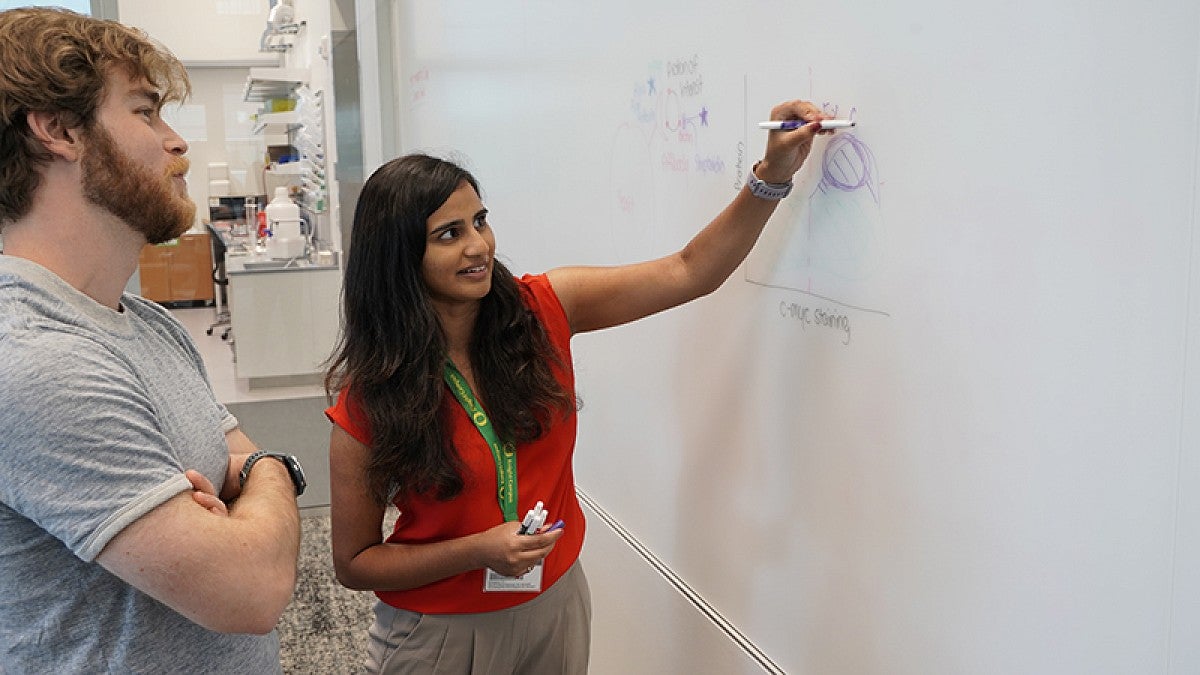The Center for Undergraduate Research and Engagement honored four faculty members this spring for excellence in mentoring students as they ask questions and seek answers.
This year’s Faculty Mentor Research Awards, including one funded by the Robert D. Clark Honors College, went to Dare Baldwin, professor of psychology; Marian Hettiaratchi, assistant professor in the Phil and Penny Knight Campus for Accelerating Scientific Impact; Diana Libuda, assistant professor of biology; and Michael Malek Najjar, associate professor of theater arts. Each received a one-time award of $2,500.
“In recognition of the outstanding pool of faculty research mentors nominated by colleagues, students and recent alumni, we added a fourth award this year,” said Kevin Hatfield, director of the Center for Undergraduate Research and Engagement and assistant vice provost for undergraduate research and distinguished scholarships.
“Despite the profound challenges the pandemic has created for undergraduate research and creative work, the nominators’ testimonies affirm how faculty mentors have persevered with empathy and innovation,” Hatfield said.
The opportune moment to begin a mentorship, Hettiaratchi said, can be one of hesitancy that’s common for those students new to the research tradition.
“Not many undergraduate students realize what research entails until they join a research group, because it’s not like anything else you learn in school,” she said. “There’s often no right answers and no protocols or instructions. Many undergraduate researchers I’ve worked with first find this daunting but ultimately love this aspect of doing research. They could be the first person to ever do a certain type of experiment.”
No one is above mentorship, Baldwin said.
“It’s possible for even highly talented students to flounder or float and not know how to find or follow their interests,” she said. “My goal is to help students identify what they love doing, build strengths and skills in those arenas, and make the transition to the next level in pursuit of their aspirations.”
Mentors shouldn’t limit their focus to strengths, Libuda said. For her, it’s about getting to know each unique student’s superpower and kryptonite.
“Whether it be the ability to talk about research, to ask or answer questions with confidence, to multitask, to think and plan experiments, to write clearly about research, or something else,” Libuda said, “I try to make sure we put their superpower to use in their projects but also help improve on whatever is their weakness.”
Libuda said she measures success when her students start to ask questions without fear. For Najjar, success in mentorship is best rewarded by the joy his theater arts students convey in the successful outcome of their work.
“It's that feeling of elation when they've been told they have successfully defended their thesis or dissertation, or have been accepted to a graduate program because of a play they've written with my mentorship,” Najjar said. “Those are priceless moments for me, because I believe it demonstrates that the countless meetings, discussions and emails that went into mentoring the student has finally paid off with their success.”
Najjar even found that mentoring in the remote environment could prove more fruitful than in regular times, he said, “because neither the student nor myself were arriving to meetings running late and feeling stressed by scheduling concerns.” He hopes to bring lessons from remote mentorship forward into his in-person relationships with students.
Learn more about the Faculty Research Mentor Awards on the Center for Undergraduate Research and Engagement website.
—By Anna Glavash Miller, University Communications


